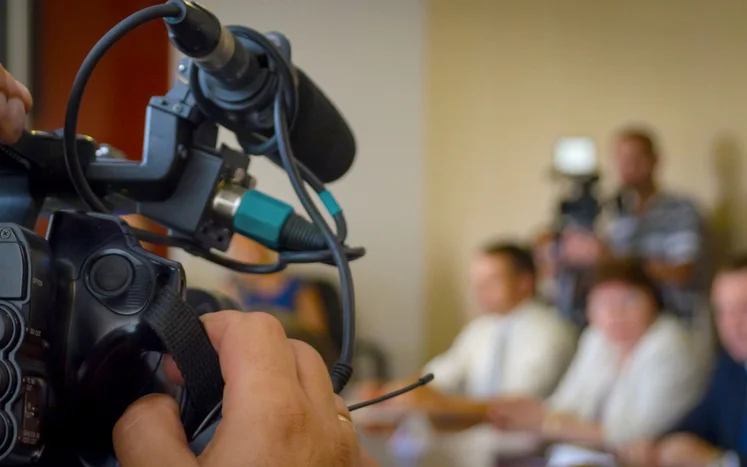The Role of Legal Videography in Depositions and Tests
Lawful videography has actually arised as a crucial device in both depositions and tests, supplying a diverse technique to documenting witness statements. As legal professionals increasingly recognize its value, it motivates a much deeper assessment of exactly how these visual records can affect juror understandings and trial outcomes.
Importance of Legal Videography
Legal videography plays a pivotal duty in the documents and presentation of depositions and trials. This customized area integrates technical abilities with lawful knowledge to produce a reputable record of process that can dramatically affect case end results. The aesthetic aspect of legal videography boosts the understanding of witness statement, permitting jurors and judges to observe not just the spoken words but additionally the demeanor, feelings, and body language of the witnesses.

The significance of legal videography extends past the court room; it additionally plays an essential function in preserving evidence for future referral, whether for allures or more lawsuit. As such, its integration right into the legal process is essential for ensuring a reasonable and precise representation of the truths, inevitably adding to the pursuit of justice.

Process of Legal Videography
While recording the subtleties of depositions and tests, the procedure of legal videography includes several crucial steps that make certain top quality, precise recordings. Originally, a professional legal videographer prepares by examining the instance materials and comprehending the details requirements of the deposition or trial. This prep work consists of acquainting themselves with the individuals and the context, which aids in capturing important details.
On the day of the recording, the videographer establishes up the needed tools, which commonly consists of high-def cams, microphones, and proper illumination. Making certain optimal angles and audio top quality is critical, as it straight influences the performance of the recording. The videographer connects with lawyers and participants to establish protocols, ensuring that everyone recognizes the recording procedure.
Throughout the deposition or trial, the videographer carefully tape-records the procedures, paying attention to both verbal and non-verbal cues. legal videography. This consists of recording the attitude and responses of witnesses and attorneys. After the session concludes, the videographer might modify the video footage for clearness and compliance with legal criteria, generating a last product that properly mirrors the procedures for future reference and use in lawful contexts
Advantages in Depositions
The consolidation of videography in depositions provides numerous advantages that improve the overall procedure of gathering proof. One main benefit is the ability to record witness statements with aesthetic and acoustic fidelity, giving a much more accurate representation of the witness's demeanor, tone, and body movement. This multidimensional method permits click resources attorneys and courts to examine trustworthiness better than standard written records alone.
Furthermore, videographed depositions offer as a powerful device for protecting testimony. Must a witness become inaccessible for trial, their taped deposition can be played in court, guaranteeing that their proof continues to be easily accessible and appropriate. This aspect considerably reduces the danger of shedding vital information that could affect instance outcomes.
In addition, the use of legal videography advertises much better preparation for lawyers. Evaluating video clip footage permits legal groups to examine and refine their strategies, recognizing staminas and weak points in their cases. click this This preparatory advantage can cause even more engaging discussions in court.
Lastly, videography enhances the total professionalism and reliability of the deposition process, instilling self-confidence in customers regarding the thoroughness of their lawful representation. By leveraging innovation, attorneys can considerably boost the efficiency of depositions.
Influence on Tests
In many trials, the combination of videography can substantially affect the presentation of proof and the court's understanding. Lawful videography catches witness statements and vital evidence in a dynamic format, allowing jurors to involve with the product on numerous levels. This aesthetic component enhances the storytelling facet of a test, supplying context and psychological vibration that standard text-based evidence may lack.
Furthermore, video recordings can act as powerful devices for impeachment throughout interrogation. When inconsistencies develop between a witness's prior declarations and their court room statement, video evidence gives an unbiased referral that can sway jurors' opinions. This immediacy and clarity can boost the reputation of an event's narrative while all at once weakening opposing disagreements.
Additionally, making use of videography can assist simplify complicated details, making it extra accessible to jurors who may have a hard time to comprehend intricate details provided you could try this out only via spoken testimony. By integrating visuals with auditory info, legal videography can enhance retention and understanding, ultimately influencing the jury's decision-making process. The impact of videography in tests expands past simple visual appeals; it plays a crucial function in shaping the lawful landscape and outcomes.
Future Trends in Legal Videography
As we look towards the future of lawful videography, numerous emerging patterns assure to reshape its role within the court room. One significant pattern is the combination of artificial intelligence (AI) in video evaluation and editing and enhancing - legal videography. AI can simplify the procedure of determining key moments in tape-recorded depositions, enabling lawyers to swiftly access appropriate web content, therefore improving effectiveness in situation preparation
In addition, the increase of virtual truth (VIRTUAL REALITY) and enhanced reality (AR) modern technologies is expected to change just how jurors experience evidence. By submersing jurors in a simulated atmosphere, these innovations can supply a much more profound understanding of intricate situations, leading to more educated deliberations.

Furthermore, the enhancing need for remote depositions, sped up by the COVID-19 pandemic, will likely proceed. Legal videographers will require to adjust to new software program and systems to make sure high-grade recordings in digital settings.
Finally, the growing focus on information safety and security will require more stringent protocols for storing and sharing video proof. As the lawful landscape evolves, lawful videographers need to stay abreast of these trends to maintain their importance and effectiveness in the judicial process.

Final Thought
In summary, legal videography serves a vital function in the judicial process, boosting the stability of depositions and trials. By capturing the nuances of witness testimonies, this tool not only maintains crucial proof however likewise help in offering information properly to jurors. The importance of visual paperwork in assessing trustworthiness and facilitating cross-examination can not be overstated. As technology remains to develop, legal videography is poised to further transform its function within the legal landscape.